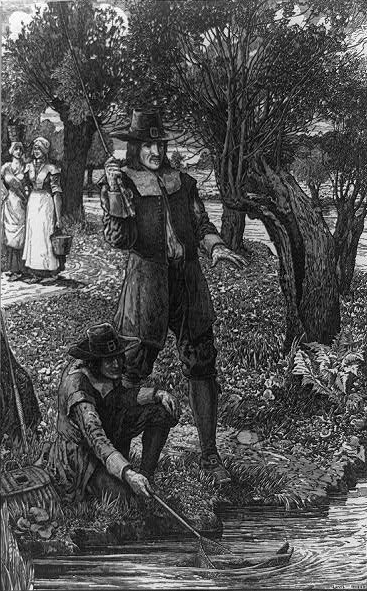
“Izaak Walton and his scholar” (1900) by Louis John Rhead.
Unless you managed to escape geometry and trig in school, when you hear the word angle, you probably have nightmares about pointy protractors and lines intersecting at strange, well, angles. But angle is not as cut-and-dry boring as you might imagine. It’s actually rather fishy. Yes, the noun angle does concern itself with all that geometry stuff but when used as a verb, angle means to fish with a line and hook. So how do we go from geometry to fishing? Read on.
The verb angle derives from the Old English verb angelen and the noun angel, which refers to an angle or hook, and was related to the word anga, meaning hook, from the Proto-Indo-European base*ang-/*ank-, which means to bend. Similar words include angulfrom Old English, öngull from Old Norse, and angul from Old High German. In case you’re wondering, Old English angel has absolutely no relation to messengers from the divine. The modern English angel is a fusion of the Old English engel and the Old French angele. Both words derived from the Latin angelus and Greek angelos. So the fishy part of angle is all a matter of the hook, that piece of metal that has been bent to form an angle, although modern fishhooks are more of a smooth curve with a barb. I suppose you could argue that the barb forms an angle.
Angling has long been a passion of many. One of the most famous books on the subject is Izaak Walton’s The Compleat Angler, first published in 1653. Walton (1593-1683) added to the book throughout his life and published several later editions during the next quarter century. In prose and verse, Walton and a few contributors extol the art and spirit of angling. Others find little to celebrate in angling and consider it a waste of time. John Palsgrave (c. 1485 – 1554), a priest in Henry VIII’s court and tutor in the royal household, wrote: “It is but a sory lyfe and an yuell to stand anglynge all day to catche a fewe fisshes.”
Attribution: Louis Rhead [Public domain], via Wikimedia Commons.


Ah, to bend. Now the two uses of the word make sense.
I know angles more from math than fishing, but it’s interesting to read about how the term came about. 🙂
Hey Jeff! Is this your new blog? Want to be sure I added the right thing to my Feedly.
Yes, it is. I should have put a message on the old one a long time ago.